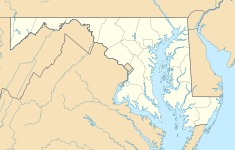Hubert Black House
| Hubert Black House | |
|---|---|
| Nearest city | Woodbine, Maryland |
| Coordinates | 39°20′00″N 77°06′00″W / 39.33333°N 77.10000°W |
| Built | 1860 |
| Architectural style(s) | Farm |
Hubert Black House is a historic house and farm located in Woodbine (Formerly Florence), Howard County, Maryland. It was named after J. Hubert Black, a Howard County parole officer, and later, a County Commissioner who ran on a no growth platform in 1962, who approved the Rouse Company development of Columbia, Maryland.[1][2][3][4]
The Black House sits on a 250-acre former dairy farmed by the Black family since 1883. The land is part of a group of original land patents named Hobson's Choice, Wise Man's Folly, Additional Defense, Range Declined, Acorn Hill, Ridgley's Great Park, The Dispute, and Dispute Ended. Former owners included Samuel and Amelia Jarden in 1872, Josuha D. Warfield in 1869, and Phillip Welsh in 1808. The house is a three-bay-wide 2+1⁄2-story building constructed in 1860 during the last years of slavery in the Howard District of Anne Arundel County. [5]
Larriland Farm
[edit]In 1963, G. Lawrence "Larry" Moore and his wife Nancy exchanged his 100-acre farm in Howard County with Commissioner J. Hubert Black, forming the 250-acre Larriland Farm. Black resold the 100-acre farm to become residential subdivisions for the Rouse Company project he approved.[6] The Larriland farm was placed in the Maryland Agricultural Land Preservation Program. [7] Outbuildings have been converted to shops for seasonal sales.[8]
See also
[edit]References
[edit]- ^ "77 take merit test for parole positions". The Washington Post. 5 February 1936.
- ^ Maryland State Manual. 1963. p. 400.
- ^ James A. Clark Jr. Jim Clark Soldier Farmer Legislator. p. 109.
- ^ Joseph Rocco Mitchell, David L Stebenne. New City Upon a Hill. p. 55.
- ^ "HO-274 Hubert Black House" (PDF). Retrieved 24 September 2014.
- ^ "How you gonna keep 'em off the farm after they've seen 'Spring Blossom". The Baltimore Sun. 5 May 1978.
- ^ "HO-274 Hubert Black House" (PDF). Retrieved 24 September 2014.
- ^ Luther Young (16 December 1979). "Rustic toolshed turns into Christmas shop". The Baltimore Sun.

